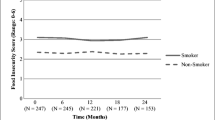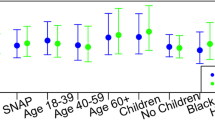Abstract
Food insecurity is a key social and health issue among persons living with HIV (PLHIV). Food insecurity oftentimes co-occurs with substance use, but little is known about the relationship between tobacco use and food insecurity particularly among PLHIV. In this study, we prospectively examined the association of cigarette smoking with food insecurity in a cohort of 108 individuals seeking vocational rehabilitation services. Over the 12-month study period, smokers at baseline reported consistently higher levels of food insecurity compared to non-smokers. Smoking remained an independent risk factor for greater food insecurity, controlling for sociodemographic characteristics and known confounders (e.g., substance use, depression). Food insecurity is a key structural and socioeconomic barrier that may partially explain HIV-related health disparities observed among smokers. Further research is needed to characterize the bio-behavioral mechanisms linking smoking and food insecurity as well as test whether smoking cessation can reduce food insecurity in PLHIV who smoke.
Similar content being viewed by others
References
Weiser SD, Tsai AC, Gupta R, et al. Food insecurity is associated with morbidity and patterns of healthcare utilization among HIV-infected individuals in a resource-poor setting. AIDS. 2012;26:67–75.
Weiser SD, Fernandes KA, Brandson EK, et al. The association between food insecurity and mortality among HIV-infected individuals on HAART. J Acquir Immune Defic Syndr. 2009;52:342–9.
Kalichman SC, Cherry C, Amaral C, et al. Health and treatment implications of food insufficiency among people living with HIV/AIDS, Atlanta, Georgia. J Urban Health. 2010;87:631–41.
Weiser SD, Yuan C, Guzman D, et al. Food insecurity and HIV clinical outcomes in a longitudinal study of urban homeless and marginally housed HIV-infected individuals. AIDS. 2013;27:2953–8.
Weiser SD, Young SL, Cohen CR, et al. Conceptual framework for understanding the bidirectional links between food insecurity and HIV/AIDS. Am J Clin Nutr. 2011;94:1729S–39S.
Kalichman SC, Hernandez D, Cherry C, Kalichman MO, Washington C, Grebler T. Food insecurity and other poverty indicators among people living with HIV/AIDS: effects on treatment and health outcomes. J Community Health. 2014;39:1133–9.
Normén L, Chan K, Braitstein P, et al. Food insecurity and hunger are prevalent among HIV-positive individuals in British Columbia, Canada. J Nutr. 2005;135:820–5.
Whittle HJ, Palar K, Hufstedler LL, Seligman HK, Frongillo EA, Weiser SD. Food insecurity, chronic illness, and gentrification in the San Francisco Bay Area: an example of structural violence in United States public policy. Soc Sci Med. 2015;143:154–61.
Anema A, Chan K, Chen Y, Weiser S, Montaner JSG, Hogg RS. Relationship between food insecurity and mortality among HIV-positive injection drug users receiving antiretroviral therapy in British Columbia, Canada. PLoS ONE. 2013;8:e61277.
Surratt HL, O’Grady CL, Levi-Minzi MA, Kurtz SP. Medication adherence challenges among HIV positive substance abusers: the role of food and housing insecurity. AIDS Care. 2015;27:307–14.
Vogenthaler NS, Hadley C, Lewis SJ, Rodriguez AE, Metsch LR, del Rio C. Food insufficiency among HIV-infected crack-cocaine users in Atlanta and Miami. Public Health Nutr. 2010;13:1478–84.
Palar K, Laraia B, Tsai AC, Johnson MO, Weiser SD. Food insecurity is associated with HIV, sexually transmitted infections and drug use among men in the United States. AIDS. 2016;30:1457–65.
Weiser SD, Bangsberg DR, Kegeles S, Ragland K, Kushel MB, Frongillo EA. Food insecurity among homeless and marginally housed individuals living with HIV/AIDS in San Francisco. AIDS Behav. 2009;13:841–8.
Kalichman SC, Hernandez D, Kegler C, Cherry C, Kalichman MO, Grebler T. Dimensions of poverty and health outcomes among people living with HIV infection: limited resources and competing needs. J Community Health. 2015;40:702–8.
Anema A, Wood E, Weiser SD, Qi J, Montaner JS, Kerr T. Hunger and associated harms among injection drug users in an urban Canadian setting. Subst Abuse Treat Prev Policy. 2010;5:1–7.
Kim JE, Tsoh JY. Cigarette smoking among socioeconomically disadvantaged young adults in association with food insecurity and other factors. Prev Chronic Dis. 2016;13:E08.
Mdodo R, Frazier EL, Dube SR, et al. Cigarette smoking prevalence among adults with HIV compared with the general adult population in the United States: cross-sectional surveys. Ann Intern Med. 2015;162:335–44.
O’Cleirigh C, Valentine SE, Pinkston M, et al. The unique challenges facing HIV-positive patients who smoke cigarettes: HIV viremia, ART adherence, engagement in HIV care, and concurrent substance use. AIDS Behav. 2015;19:178–85.
Helleberg M, Afzal S, Kronborg G, et al. Mortality attributable to smoking among HIV-1-infected individuals: a nationwide, population-based cohort study. Clin Infect Dis. 2013;56:727–34.
Worm SW, Bower M, Reiss P, et al. Non-AIDS defining cancers in the D:A: D study—time trends and predictors of survival: a cohort study. BMC Infect Dis. 2013;13:471.
Hile SJ, Feldman MB, Alexy ER, Irvine MK. Recent tobacco smoking is associated with poor HIV medical outcomes among HIV-infected individuals in New York. AIDS Behav. 2016;20:1722–9.
Kapulsky L, Tang AM, Forrester JE. Food insecurity, depression, and social support in HIV-infected Hispanic individuals. J Immigr Minor Health. 2015;17:408–13.
Palar K, Kushel M, Frongillo EA, et al. Food insecurity is longitudinally associated with depressive symptoms among homeless and marginally-housed individuals living with HIV. AIDS Behav. 2015;19:1527–34.
Gómez W, Flentje A, Schustack A, et al. Navigating barriers to vocational rehabilitation for HIV-positive persons. AIDS Behav. 2016;20:1132–42.
Coates J, Swindale A, Bilinsky P. Household food insecurity access scale (HFIAS) for measurement of food access: indicator guide (v. 3). Washington, DC: Food and Nutrition Technical Assistance Project, Academy for Educational Development; 2007.
Beck A, Steer R, Brown G. Manual for beck depression inventory-II (BDI-II). San Antonio, TX: Psychology Corp; 1996.
Skinner HA. The drug abuse screening test. Addict Behav. 1982;7:363–71.
Wu AW, Revicki DA, Jacobson D, Malitz FE. Evidence for reliability, validity and usefulness of the medical outcomes study HIV health survey (MOS-HIV). Qual Life Res. 1997;6:481–93.
Cohen J. Statistical power analysis for the behavioral sciences. 2nd ed. Hillsdale, NJ: Erlbaum; 1988.
Busch SH, Jofre-Bonet M, Falba TA, Sindelar JL. Burning a hole in the budget: tobacco spending and its crowd-out of other goods. Appl Health Econ Health Policy. 2004;3:263–72.
Siahpush M, Borland R, Yong H-H. Sociodemographic and psychosocial correlates of smoking-induced deprivation and its effect on quitting: findings from the International Tobacco Control Policy Evaluation Survey. Tob Control. 2007;16:e2.
Calvo M, Laguno M, Martínez M, Martínez E. Effects of tobacco smoking on HIV-infected individuals. AIDS Rev. 2015;17:47–55.
Kim JE, Flentje A, Tsoh JY, Riley ED. Cigarette smoking among women who are homeless or unstably housed: examining the role of food insecurity. J Urban Health. 2017;94:514–24.
Coleman-Jensen A, Rabbitt MP, Gregory CA, Singh A. Household food security in the United States in 2016, ERR-237. U.S. Department of Agriculture, Economic Research Service. 2017. https://www.ers.usda.gov/webdocs/publications/84973/err-237.pdf?v=42979.
Jo Y-H, Talmage DA, Role LW. Nicotinic receptor-mediated effects on appetite and food intake. J Neurobiol. 2002;53:618–32.
Akhtar-Khaleel WZ, Cook RL, Shoptaw S, et al. Trends and predictors of cigarette smoking among HIV seropositive and seronegative men: the multicenter AIDS cohort study. AIDS Behav. 2016;20:622–32.
Hatsu I, Hade E, Campa A. Food security status is related to mental health quality of life among persons living with HIV. AIDS Behav. 2017;21:745–53.
Pacek LR, Latkin C, Crum RM, Stuart EA, Knowlton AR. Current cigarette smoking among HIV-positive current and former drug users: associations with individual and social characteristics. AIDS Behav. 2014;18:1368–77.
Centers for Disease Control and Prevention, State Tobacco Activities Tracking & Evaluation (STATE) System. Map of current cigarette use among adults (behavior risk factor surveillance system) 2014. 2016. http://www.cdc.gov/statesystem/cigaretteuseadult.html.
Carrico AW, Zepf R, Meanley S, Batchelder A, Stall R. When the party is over: a systematic review of behavioral interventions for substance-using men who have sex with men. J Acquir Immune Defic Syndr. 1999;2016(73):299–306.
Safren SA, Bedoya CA, O’Cleirigh C, et al. Cognitive behavioural therapy for adherence and depression in patients with HIV: a three-arm randomised controlled trial. Lancet HIV. 2016;3:e529–38.
Ledgerwood DM, Yskes R. Smoking cessation for people living with HIV/AIDS: a literature review and synthesis. Nicotine Tob Res. 2016;18:2177–84.
Pool ERM, Dogar O, Lindsay RP, Weatherburn P, Siddiqi K. Interventions for tobacco use cessation in people living with HIV and AIDS. Cochrane Database Syst Rev. 2016. https://doi.org/10.1002/14651858.CD011120.pub2.
Grover KW, Gonzalez A, Zvolensky MJ. HIV symptom distress and smoking outcome expectancies among HIV + smokers: a pilot test. AIDS Patient Care STDs. 2013;27:17–21.
Funding
Data collection for this study was funded by a Community Collaborative Research Award from the California HIV/AIDS Research Program (CR09-PO-450 and CR09-SF-451). Writing of the article was supported by the National Institutes of Health, T32 DA007250 and K01 DA043659. The funding agencies had no involvement in the design and conduct of the study, data analysis, interpretation of the data, or preparation and submission of the article.
Author information
Authors and Affiliations
Corresponding author
Ethics declarations
Conflict of interest
The authors have no conflicts of interest to report.
Ethical Approval
All procedures performed in studies involving human participants were in accordance with the ethical standards of the institutional and/or national research committee and with the 1964 Helsinki declaration and its later amendments or comparable ethical standards.
Rights and permissions
About this article
Cite this article
Kim-Mozeleski, J.E., Tsoh, J.Y., Ramirez-Forcier, J. et al. Smoking Predicts Food Insecurity Severity among Persons Living with HIV. AIDS Behav 22, 2861–2867 (2018). https://doi.org/10.1007/s10461-018-2069-6
Published:
Issue Date:
DOI: https://doi.org/10.1007/s10461-018-2069-6




